Commercial CRM solutions tend to offer a limited set of capabilities, usually only covering essential processes for customer management. However, organizations from different industries handle different types of data, not to mention that their marketing and sales processes can vary significantly.
Businesses with highly specific demands ー like original equipment manufacturers (OEMs), automakers, specialized manufacturers in the automotive sector, and car dealerships ー need more robust, industry-tailored CRMs.
In this article, we discuss why automotive organizations need custom CRMs and what benefits you can get from building one. You’ll also discover the main features and components that custom CRM solutions require, along with challenges of custom CRM development and ways to overcome them.
This article will be helpful for CRM vendors wanting to target the automotive market and for automotive organizations planning to create a custom CRM solution to cover their needs.
What is automotive CRM software?
What is a CRM?
Customer relationship management (CRM) is a set of practices, strategies, and technologies for managing and analyzing customer interactions. Organizations use it to drive sales, retain customers, and improve customer service relationships.
CRM solutions (or systems) are special software that tracks all interactions with prospects and customers, including sales calls, mailouts, direct emails, website interactions, live chat, marketing materials, and social network interactions.
What is an automotive CRM?
An automotive CRM is a customer relationship management platform designed to meet the unique demands of the automotive sector. The set of features in this kind of CRM might vary depending on which type of organization the CRM targets.
Why do automotive businesses need CRM solutions?
It’s hard to imagine a business that doesn’t use software for customer relationship management. According to a Freshworks survey, in 2024, most businesses saw their sales revenue increase by 21–30% after implementing a CRM platform.
Different automotive organizations can perform different tasks with such software.
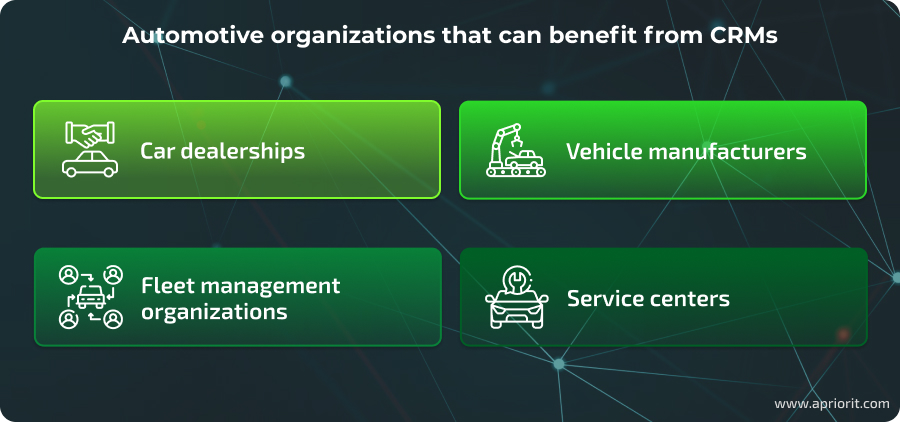
- Car dealerships can use CRM systems to manage customer interactions and sales processes, automate follow-up communications, track and analyze detailed records of customer preferences, tailor marketing campaigns for different customer segments, and more.
- Vehicle manufacturers can leverage such solutions for managing dealership networks, analyzing customer data, improving marketing strategies, and managing after-sale services.
- Fleet management organizations can use CRMs to manage driver interactions, maintain schedules, optimize fleet operations, and improve fleet utilization.
- Service centers can implement CRMs to manage appointments, track the history of interactions and services, and send vehicle maintenance reminders.
Which CRM should I choose?
Before implementing a CRM into their workflow, automotive organizations should answer two questions::
- Should we use generic or industry-specific software?
- Will an off-the-shelf solution cover all of our business needs, or do we need a custom-built product?
Let’s take a closer look at how to answer them in the next two sections.
Need help building a custom SaaS solution?
Receive a secure and reliable CMR, ERP, payroll, or other software product by entrusting your project to Apriorit engineers!
CRM benefits: Generic vs industry-specific
When deciding to implement a CRM solution into their processes, automotive companies can choose a generic system designed for all businesses or an industry-specific solution. While general-purpose CRMs usually cover essential business needs, some organizations might want additional industry-specific functionality:
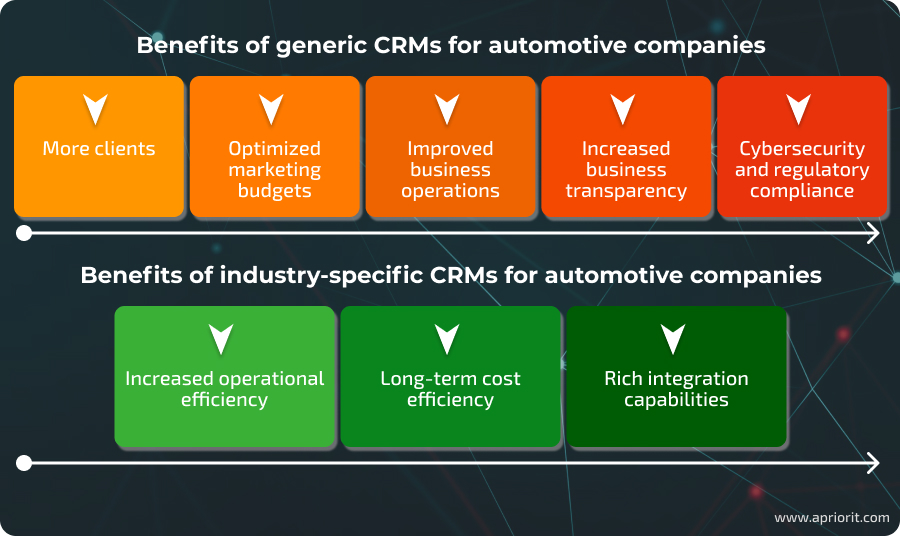
Let’s first take a look at advantages automotive organizations can achieve from one-size-fits-all CRM software:
- Attract new clients and retain current ones thanks to enhanced lead management and customer service capabilities
- Enhance business operations by improving customer-related communications between sales, marketing, accounting, and other departments
- Achieve transparency into business efficiency by analyzing automatically generated reports on sales conversions, KPIs, ROI, and other essential metrics
- Optimize marketing budgets by figuring out the highest-performing marketing channels and campaigns, as CRMs help track sources of new leads
- Maintain compliance with cybersecurity and regulatory requirements by securely storing all sensitive data in a dedicated CRM solution that uses encryption and other essential data protection mechanisms
When choosing a highly tailored CRM, automotive businesses can also gain additional benefits, including:
- Increased operational efficiency. Even basic features included in a CRM for the automotive industry are tailored to industry needs. For example, custom solutions can already include vehicle-related data types. This improves the user experience for employees and simplifies handling of automotive business processes. Not to mention additional features that are tailored to a particular organization’s processes and are easy to adjust.
- Long-term cost efficiency. With automotive-specific CRMs, organizations don’t need to spend time and money on creating additional features or adjusting current ones like they do when working with generic CRM solutions.
- Rich integration capabilities. Automotive CRM software usually allows for easy and efficient integration with various types of software that the majority of organizations already use, like Dealer Management Systems (DMS) and Enterprise Resource Planning (ERP) solutions. This helps businesses synchronize customer data as well as information about vehicles and parts across different departments and software.
Choosing between custom and ready automotive CRMs
Automotive organizations implement CRMs in their workflows to enhance productivity, increase efficiency, and cut expenses. But sometimes a chosen solution can’t fully cover all business needs. Therefore, automotive organizations can find themselves needing to add new features to the CRM they use or even shifting to other software.
When choosing which solution to use next, businesses first decide whether to purchase a ready-to-use product from a vendor or develop a custom one from scratch. Let’s overview the main points automotive businesses should consider when making this decision:
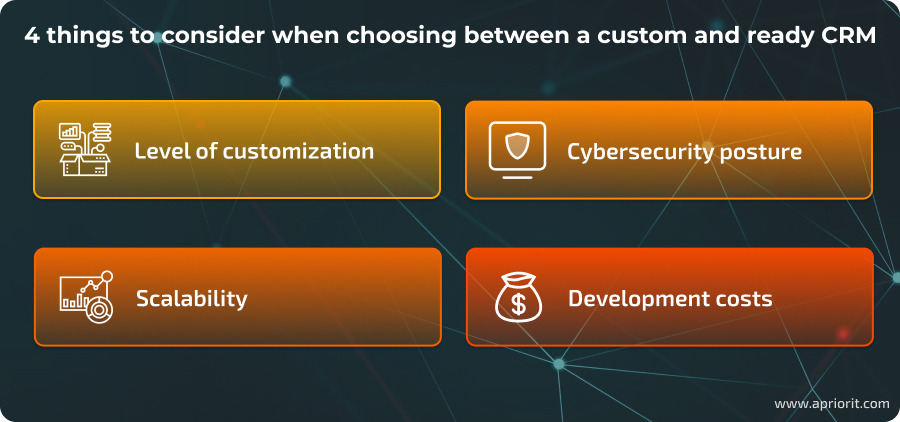
- Level of customization. Although the CRM market offers a few solutions targeted at automotive organizations, these products might not fully cover all business needs of some businesses. And requesting additional features or modifying existing ones can require a lot of time and money. Developing custom CRM software from scratch allows you to have all the functionality your business requires.
- Cybersecurity posture. With many CRM vendors offering SaaS solutions, security mechanisms become a shared responsibility between the vendor and the automotive business. But SaaS CRM clients are not always fully aware of cybersecurity measures on the vendor’s side and do not always fully understand how to configure security settings on their side. When building a custom product, businesses can request solid security measures for the solution architecture, customer data, and corporate infrastructure. Having your own product built from scratch gives you full visibility over its cybersecurity posture.
- Scalability. Decent out-of-the-box solutions usually provide clients with an opportunity to scale their products according to their current needs. However, adjusting the scalability of your off-the-shelf CRM to support growth usually requires extra effort from your team and additional costs. With a custom solution, you only need to make sure your development vendor designs the product architecture with potential future scalability needs in mind.
- Development cost. All the possibilities and benefits of custom CRM solutions come at a price. Apart from development costs, you also should keep support and maintenance expenses in mind. If an out-of-the-box CRM solution with automotive-centric modules can cover your business needs, then there’s no need to build a new one from scratch. However, if your business requires high customization, strong cybersecurity measures, and a unique user experience for both employees and customers, developing a custom solution can be cost-efficient in the long run.
Related project
Optimizing and Securing a SaaS Platform by Migrating to Angular
Discover the challenges and triumphs of migrating a complex SaaS platform to Angular. Learn how we enhanced system performance, future-proofed the architecture, and delivered a user-centric solution.

Must-haves for automotive CRMs: Features, modules, components
Once you decide to build a custom CRM solution or improve an existing one, make sure to carefully plan the functionality. Below, we list both crucial elements for generic CRMs and industry-specific components for automotive CRMs.
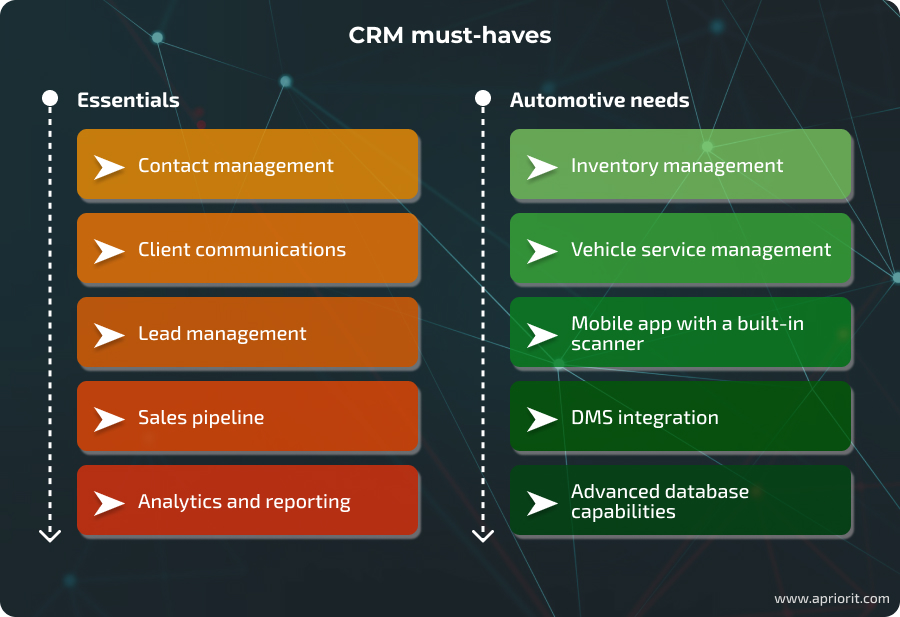
Let’s start with basic but essential modules and capabilities any CRM must have and discuss their importance for automotive solutions:
- Contact management helps employees organize and manage prospect and customer information. Apart from fields for essential details like name, phone number, and email address, make sure to have customized fields for adding other important details specific to your business: purchased vehicles and parts, recent service appointments, etc.
- Client communications help employees manage communications across different channels and track the history of previous contacts. A client communications module might include features for automating emails and scheduling service appointments.
- Lead management helps to capture leads from all possible sources like website forms, offline events, social media, and email marketing campaigns. Make sure your CRM offers features for efficient lead qualification, tracking, and nurturing. These could be related to reporting, lead routing automation, and marketing campaign management.
- A sales pipeline helps employees easily manage the sales process, breaking it down into specific stages with progress visualized for each lead and customer. This module must provide a variety of features like calculating expected revenue, logging close dates, assigning tasks to team members, managing sales activities, analyzing historical data, and forecasting sales revenue.
- Analytics and reporting capabilities can be implemented as separate features for different modules or as independent modules. This functionality is essential for business owners and top management, as it can show an organization’s performance results by structuring all customer and sales data in digestible reports. Make sure the analytics and reporting features are able to handle data that matters to your business. This can be information on sold vehicles, efficiency of fleet use, closed-won and closed-lost deals, the number of OEMs worked with, etc.
Note: In this list, we didn’t mention features like contract management, invoicing, and payments that can be part of a CRM’s financial module. Oftentimes, automotive companies use other solutions like dealership management software (DMS) or accounting products for those activities. In such a case, make sure that your CRM can integrate with other tools you use so that sales managers can import data on signed contracts and successful payments to respective CRM records.
Depending on your niche in the automotive industry, you will need to enhance your CRM with additional features and even apps that are not offered by generic solutions:
1. Inventory management functionality allows automotive businesses to track their inventory in real time by monitoring vehicle availability and creating detailed records of each vehicle’s specifications. This functionality can also allow companies to update vehicle photos and details across web apps and corporate software from one central location.
With efficient inventory management in place, automotive organizations can monitor what vehicles are in high demand, quickly connect vehicles to prospects, and even set automated notifications in case vehicles have been in stock too long. This allows businesses to quickly react and perhaps decide to launch marketing actions or discounts before storage costs and other expenses related to those vehicles get too high.
2. Vehicle service management functionality usually comes in the form of a self-service portal that lets end users conveniently choose services, create and reschedule appointments, set up convenient notification schedules, and see their vehicle maintenance history. Organizations can also create maintenance packages for a specific year, make, or model to improve user experience and drive more revenue.
A self-service portal might also benefit from a warranty management feature to collect customer claims and send them to manufacturers. Another useful feature is order management to help customers quickly and easily request new parts for repairs.
3. A CRM mobile app simplifies work for employees, allowing for better flexibility and efficiency, especially during conferences, offline meetings, and other events. If your CRM also has a customer portal, an app for smartphones and tablets can significantly improve the user experience.
Automotive CRM apps can benefit from a built-in scanner to quickly upload important documents like drivers’ licences, insurance agreements, and pay stubs to customers’ records. Such a feature may also help organizations eliminate mistakes by scanning vehicle barcodes and other vital data.
4. Integration capabilities. An automotive CRM should be able to integrate with both traditional corporate software ー like payroll solutions, ERPs, marketing tools, and project management products ー and industry-specific software. For example, it’s crucial to enable integrations with dealer management systems like iDMS, DealerTrack, Auto Master Systems, or AutoSoft to exchange valuable customer data.
5. Advanced database features are key to the smooth operation of automotive businesses. Due to the complexity of sales processes, customer interactions, and using several types of corporate software simultaneously, data can be duplicated or incomplete.
To address such issues, consider going with a CRM that synchronizes and merges customer data between sales and service departments. You can also search for automated database maintenance features that update customer records and reconcile duplicate data.
If you decide to develop a custom CRM solution, make sure to explore the issues your team is likely to face and find out how to handle them. In the next section, we list a few major pitfalls and ways to eliminate them.
Read also
Automotive Software Development: Trends and Challenges
Stay ahead in automotive software development! Discover emerging trends and practical strategies for overcoming industry challenges.

Challenges of automotive CRM development
Whether you want to create an automotive CRM solely for your organization’s use or develop a SaaS solution as a CRM provider, your team must be prepared to overcome some common challenges.
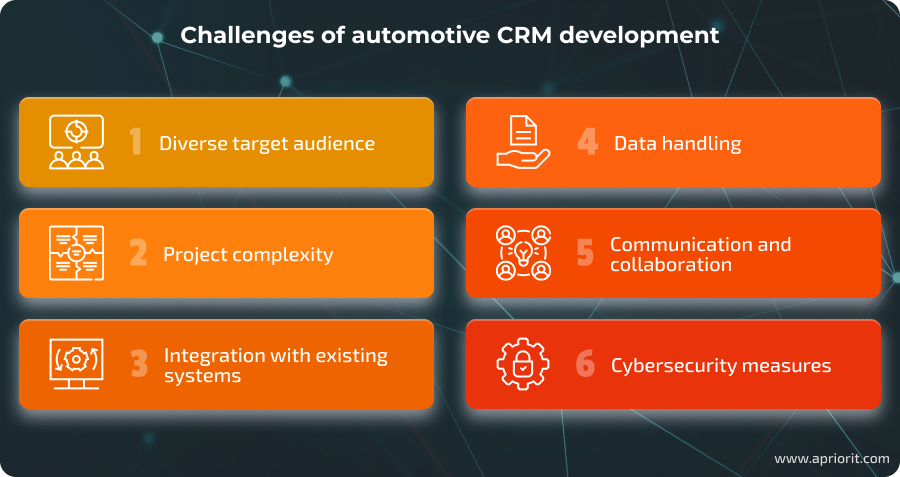
1. Diverse target audience. If you are a software vendor in the automotive market, you can face the challenge of deciding on your primary target audience. The way you build a CRM solution will vary depending on whether you target vehicle manufacturers, fleet managers, dealerships, or service centers. A potential solution would be to build modular features tailored to each customer segment, allowing you to expand your business without compromises.
2. Project complexity. Accurate planning and efficient development processes are crucial for delivering a truly reliable CRM solution in a fixed time frame. Your team must outline both standard components and automotive-specific functionalities, plan architecture with scalability and flexibility in mind, implement cybersecurity measures, and thoroughly test and deploy the software. Each of these stages hides its own challenges and risks that could affect the established time and budget limitations. To ensure a smooth development process, consider outsourcing CRM development to a company with relevant experience.
3. Integration with existing systems. As in any other industry, automotive companies may use different IT products within their corporate infrastructure. These can be inventory management solutions, database management systems, and payroll software. Your team must be prepared to efficiently manage APIs that ensure CRM integration with other software. Another issue is that some tools may be challenging to integrate with because of legacy code or a lack of APIs. In such cases, consider building custom APIs to establish integrations.
4. Data handling. A CRM solution must store, process, and analyze tons of data of various types. This brings a few challenges for software developers, such as:
- Ensuring secure and efficient storage for all data the CRM generates: contact information, sales, marketing campaigns, data from IoT sensors, documentation, etc. One way to do so is by configuring scalable cloud-based storage that integrates robust data analytics tools and has strong data encryption mechanisms.
- Enabling real-time data integration for organizations that work with connected vehicle systems. To overcome this challenge, consider integrating your CRM with an IoT platform to bridge telematics data.
- Ensuring compliance with the GDPR, TISAX, and local laws by making sure all data is handled securely and with customer consent. For this, choose a software development vendor with experience delivering compliant IT products.
5. Communication and collaboration. CRMs must provide businesses with customer-related data from different sources. Enabling functionality that captures and unifies information from websites, apps, social media, referral programs, phones, and offline visits is challenging. Consider implementing an omnichannel communication platform that will send updates to a CRM in real time.
The challenge with a CRM for vehicle manufacturers is to ensure communications and operations within their dealership networks. We suggest creating dealership portals within the manufacturer’s CRM for streamlined communication and data sharing.
6. Cybersecurity measures. Automotive CRMs hold tons of sensitive data like customers’ personal information, vehicle details, sales data, and corporate information. In order to keep all this data safe from leaks and attacks, your team must add proper security mechanisms. Consider using secure software development lifecycle (SDLC) principles to make sure your solution is protected on every level and that sensitive data is safe.
Read also
How to Build a Custom CRM Solution: Benefits, Types, and Development Considerations
Build a CRM that fits your business. Learn the key steps, challenges, and best practices for developing a custom CRM that enhances efficiency and growth.

How Apriorit can help you with automotive CRM development
The Apriorit team will help you build a CRM solution that can tackle the exact list of tasks you have in mind. You can trust us because we have rich experience developing SaaS solutions like CRMs and ERPs for industries from human resources to healthcare. Our engineers already know what pitfalls to expect during the software development process and how to successfully overcome them with no effect on deadlines and the agreed budget. And as a TISAX-certified company, Apriorit implements all necessary cybersecurity measures to every automotive solution we deliver. All this makes us more than qualified to build a reliable solution for your automotive organization.
Here are a few main vectors of automotive CRM development you can pursue when partnering with Apriorit:
- Develop and support a CRM solution according to your business needs and technical requirements
- Carefully pick technologies and tools that are both efficient and suitable for your automotive software project
- Design a database structure that improves SaaS data security
- Add AI-based features like helpful chatbots for customer portals and text processing modules to help employees process data faster
- Detect vulnerabilities in existing products and offer solutions to fix them
- Integrate your solution with IoT platforms and embedded systems to ensure streamlined data flow from IoT devices
- Create and maintain a software bill of materials with automotive software project nuances in mind
- Conduct thorough quality assurance activities to timely identify and eliminate any issues, making sure your software runs smoothly and securely
- Implement a blockchain if your automotive project needs an additional level of security and transparency
- Optimize an existing SaaS solution, introduce new security measures, and even migrate your software to another platform
Whether you’re building a product from scratch or upgrading an existing system (and whether you need a dedicated solution for your organization only or a market-ready product to offer to others), Apriorit’s experienced developers are here to help.
Conclusion
Industry-tailored CRMs only include the features businesses need and don’t contain unused functionality whose cost is included in the software price. Thanks to the focus on vehicle-related data and the nuances of how automotive organizations run their businesses, such solutions help businesses enhance various processes. The benefits of CRMs in the automotive industry include accelerating sales processes, reaching more customers, and providing valuable data-driven insights through visual reports and analytics.
However, creating a custom automotive CRM is not easy. Your team must thoughtfully plan the development process, making sure to establish top-notch data security, add all required modules and components, and integrate with other software used by automotive businesses.
At Apriorit, we have professional SaaS development teams ready to build an industry-tailored solution that meets the specific needs of your automotive business.
Develop scalable, protected, and business-centered software for your organization!
Outsource engineering tasks to Apriorit’s experts in SaaS development who have experience creating successful solutions for the automotive industry.


